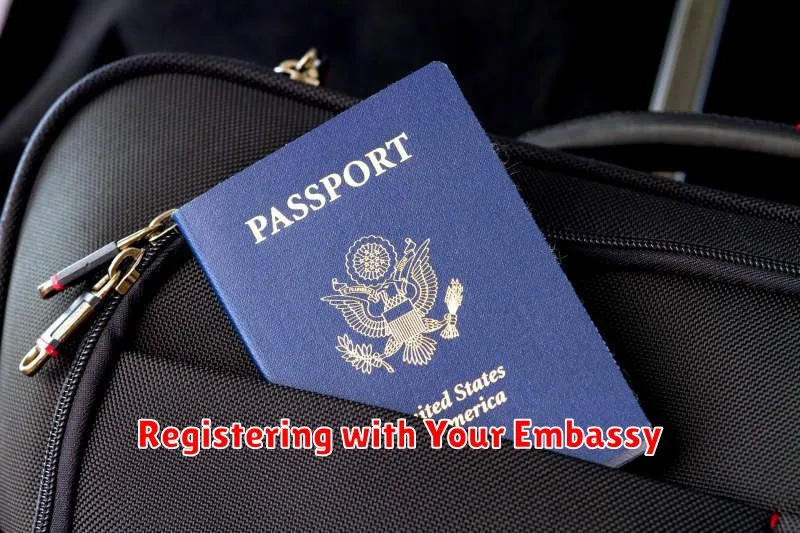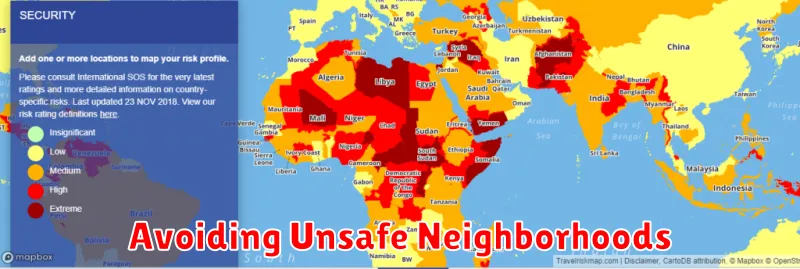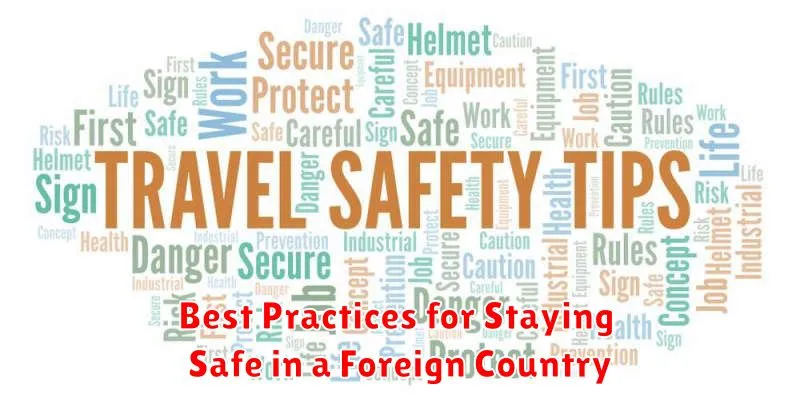Traveling to a foreign country can be an enriching experience, filled with new sights, sounds, and cultures. However, ensuring your safety and security should always be a top priority. Understanding the best practices for staying safe in unfamiliar surroundings can significantly mitigate potential risks and allow you to enjoy your travels with peace of mind. This article will provide invaluable insights and safety tips to help you navigate unfamiliar territories and stay safe while abroad, covering everything from pre-trip planning and cultural awareness to on-the-ground precautions and emergency preparedness. By adhering to these best practices, you can minimize risks and maximize your enjoyment of international travel.
Whether you’re a seasoned globetrotter or embarking on your first international adventure, staying informed and prepared is paramount. This guide will equip you with essential knowledge and practical safety tips, enabling you to confidently navigate potential hazards and enjoy a secure and memorable trip. From protecting your valuables and staying aware of your surroundings to understanding local customs and laws, we’ll cover the best practices for safe travel, helping you create a positive and secure experience in any foreign country.
Why Safety Should Be Your Priority
Safety is paramount, both personally and professionally. Prioritizing safety minimizes risks, prevents accidents, and fosters a secure environment. By proactively identifying and mitigating potential hazards, we protect ourselves, our colleagues, and the public. Thinking about safety first can save lives and prevent injuries, both minor and catastrophic. It also promotes peace of mind and reduces stress, knowing that precautions have been taken to prevent harm.
Beyond the immediate benefits, prioritizing safety also has long-term advantages. A strong safety culture boosts productivity and efficiency. When employees feel safe, they are more focused and perform their tasks with greater confidence. This leads to improved operational outcomes and reduced downtime caused by accidents or incidents. Investing in safety is an investment in the future success of any individual or organization.
Finally, prioritizing safety demonstrates a commitment to ethical and responsible behavior. It shows that we value the well-being of others and are willing to take the necessary steps to protect them from harm. Making safety a priority isn’t just good practice, it’s the right thing to do. It fosters trust and strengthens relationships, creating a positive and supportive environment where everyone can thrive.
Researching Local Laws and Customs
When traveling to a new destination, researching local laws and customs is crucial for a respectful and enjoyable experience. Understanding cultural norms regarding dress, greetings, and social interactions can help prevent misunderstandings and demonstrate cultural sensitivity. Furthermore, being aware of specific laws related to activities like alcohol consumption, photography, and transportation is essential to avoid legal issues. Start your research by consulting online resources, travel guides, and even contacting the local embassy or consulate for the most up-to-date and accurate information.
Pay particular attention to laws and customs surrounding sensitive topics such as religion, politics, and gender roles. What might be considered acceptable behavior in your home country could be offensive or even illegal elsewhere. Being prepared and informed allows you to navigate these nuances with respect and avoid causing unintentional offense. Remember that respecting local customs demonstrates cultural sensitivity and fosters positive interactions with the local community.
Investing a little time in pre-trip research can significantly enhance your travel experience. By understanding the local laws and customs, you can avoid potential difficulties, show respect for the local culture, and contribute to a more positive and meaningful travel experience. Ultimately, being a responsible traveler enriches not only your own journey but also benefits the communities you visit.
Registering with Your Embassy

Registering with your embassy or consulate when traveling or living abroad is a highly recommended safety precaution. It allows your government to contact you in case of an emergency, such as a natural disaster, political unrest, or a family emergency back home. Registration also makes it easier for your embassy to assist you if you lose your passport, require medical assistance, or face other difficulties abroad. While registration is voluntary, it can be a crucial resource in challenging situations.
The registration process is typically straightforward and can often be completed online. You will likely need to provide information such as your passport details, travel dates, and contact information while abroad. Some embassies also allow you to register family members traveling with you. Be sure to keep your registration information up-to-date, especially if your travel plans change. Check your embassy or consulate’s website for specific instructions and requirements.
By registering, you gain access to important updates and safety information from your government. This might include travel advisories, security alerts, and information on local laws and customs. In the event of a crisis, your embassy can use this information to locate and assist you more efficiently. Remember, registering provides you with an added layer of security and support while you are away from home.
Avoiding Unsafe Neighborhoods

Staying safe, especially when traveling or moving to a new area, requires awareness of your surroundings. Researching potential destinations is crucial. Utilize online resources, crime mapping tools, and local news outlets to gain insights into neighborhood safety. Consulting with residents or local law enforcement can also provide valuable, real-time information. Being informed about an area’s safety profile empowers you to make informed decisions about where to visit, live, and spend your time.
When navigating unfamiliar areas, practice situational awareness. Be mindful of your surroundings and avoid distractions like cell phones or headphones. Walk confidently and at a steady pace, projecting an air of alertness. Stick to well-lit and populated areas, especially at night. If you feel uneasy, trust your instincts and relocate to a safer location. Having a plan and being prepared can significantly enhance your safety.
If you find yourself in an unsafe situation, prioritize your safety. Avoid confrontation and if necessary, comply with demands to protect yourself. Memorize key details like descriptions of individuals or vehicles involved, and report the incident to the authorities as soon as possible. Your safety is paramount, and taking proactive steps can minimize risks.
Using Transportation Safely
Safety is paramount when using any form of transportation. Whether you’re driving a car, riding a bicycle, taking public transit, or walking, following safety guidelines is crucial to protect yourself and others. Always be aware of your surroundings, obey traffic laws, and use appropriate safety equipment like seatbelts, helmets, and reflective gear. Pre-trip planning, including checking weather conditions and route information, is essential for a safe journey.
For drivers, maintaining a safe following distance, staying focused on the road, and avoiding distractions like cell phones are vital. Pedestrians should utilize crosswalks and sidewalks, and cyclists should ride predictably and signal their intentions clearly. On public transportation, be mindful of other passengers and follow the rules set by the transportation authority. Reporting any safety hazards or suspicious activity contributes to a safer environment for everyone.
Remember, personal responsibility plays a significant role in transportation safety. Make informed decisions, never operate a vehicle under the influence of drugs or alcohol, and prioritize safety above all else. By taking these precautions, you can significantly reduce the risk of accidents and arrive at your destination safely.
Handling Emergency Situations Calmly
Emergency situations can be overwhelming, but staying calm is crucial for effective action. First, assess the situation. Quickly identify the immediate danger and any potential hazards. If possible, move yourself and others to a safe location. Then, take a deep breath and try to focus. Panic clouds judgment and hinders rational thinking. Remind yourself that clear thinking is essential to navigating the situation successfully.
Next, call for help if needed. Dial the appropriate emergency number for your location (e.g., 911 in the US) and provide clear, concise information to the dispatcher. Describe the situation, your location, and any injuries or immediate needs. Follow the dispatcher’s instructions carefully and do not hang up until instructed to do so. If the situation does not require emergency services, consider contacting other relevant resources, such as a building manager, security personnel, or a trusted friend or family member.
Finally, provide assistance where possible while prioritizing your own safety. If you are trained in first aid or CPR, offer assistance if it is safe to do so. Otherwise, focus on comforting and reassuring others who may be distressed. Remember to stay aware of your surroundings and be prepared to adapt to changing circumstances. After the situation is resolved, take time to reflect on what happened and seek support if needed. Processing the experience can help you better prepare for future emergencies.
Keeping Important Documents Secure
Protecting your important documents is crucial for safeguarding your personal information and financial well-being. This includes documents like birth certificates, social security cards, passports, wills, financial records, and property deeds. Taking proactive steps to secure these items can prevent identity theft, fraud, and significant headaches down the road.
Several methods can be employed to keep your documents safe. A fireproof and waterproof safe is an excellent investment for protecting physical copies. For digital documents, create strong passwords and use encryption software. Consider using two-factor authentication for added security on accounts where you store digital copies. Regularly back up your digital files to a secure external hard drive or cloud storage.
Beyond physical and digital security, consider organizing your documents. Knowing exactly where each document is located can save you valuable time and stress when you need them. Create a system that works for you, whether it’s physical file folders or categorized digital folders. This organization will make it easier to notice if anything is missing and allows you to quickly access documents in an emergency.

